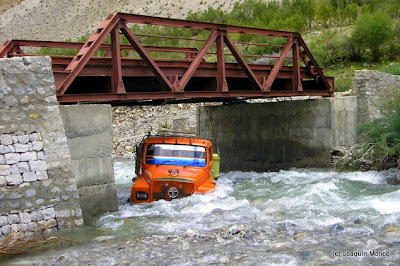En las islas Phi Phi no hay carreteras, apenas caminos. Sólo sendas embarradas e imposibles que no llevan a ninguna parte, al borde del mar entre árboles espesos y mosquitos, a cabañas dormidas que se alzan sobre postes y cangrejos, a pedazos de soledad azul. Senderos que se cierran a medida que se abren, donde el aliento y el aire es agua.
Los coches en las islas Phi Phi son inverosímiles pues no tienen donde clavar sus fauces y garras de animal salvaje. Los pies descalzos y a lo sumo las bicicletas campan a sus anchas por la arena y el barro de Tonsai. La tierra se disuelve en espuma por todos los rincones, la costa tibiamente se va deshaciendo en terrones morenos que las olas arrebatan con su respiración.
En las Phi Phi los caminos son circulares pues siempre terminan dando la vuelta y girando como peonzas. Para ir de un lugar a otro la vía más corta y rápida no es la línea recta, sino la curva y la parábola sobre las olas en torno a los arrecifes y acantilados. Los taxistas esperan al borde del agua para arrancar el motor y deslizar sobre el mar su barca de proa alta decorada de mil colores. Los long tail revolotean en torno a las islas como abejas rasgando con su hélice de largo mástil las sendas efímeras que unen las tierras.
(Islas Phi Phi, noviembre de 2010)
********
LONG TAIL (PHI PHI, THAILAND)
In Phi Phi islands are no roads, just paths. Only muddy and impossible trails leading nowhere, to the seaside among dense trees and mosquitoes, to sleeping cabins rising on poles and crabs, to pieces of blue solitude. Trails that close as they open, where breath and air are water.
The cars in the Phi Phi islands are unlikely since they have nowhere to sink their wild animal's fangs and claws. Bare feet and at the most bikes roam freely on Tonsai's sand and mud. The earth dissolves into foam everywhere, the coast warmly crumbles in brown lumps that the waves take away with their breath.
In Phi Phi islands the ways are circular because they always end up turning around and spinning like tops. To get from one place to another the shortest and fastest route is not the straight line, but the curve and the parabola on the waves around reefs and cliffs. Taxi drivers await at the water's edge to start the engine and glide over the sea their high bow boat decorated in a thousand colors. The long tail flutter around the islands like bees tearing with the long mast propeller the ephemeral paths that connect the lands.
(Phi Phi Islands, November 2010)
The cars in the Phi Phi islands are unlikely since they have nowhere to sink their wild animal's fangs and claws. Bare feet and at the most bikes roam freely on Tonsai's sand and mud. The earth dissolves into foam everywhere, the coast warmly crumbles in brown lumps that the waves take away with their breath.
In Phi Phi islands the ways are circular because they always end up turning around and spinning like tops. To get from one place to another the shortest and fastest route is not the straight line, but the curve and the parabola on the waves around reefs and cliffs. Taxi drivers await at the water's edge to start the engine and glide over the sea their high bow boat decorated in a thousand colors. The long tail flutter around the islands like bees tearing with the long mast propeller the ephemeral paths that connect the lands.
(Phi Phi Islands, November 2010)
(c) Copyright del texto y de las fotos: Joaquín Moncó












